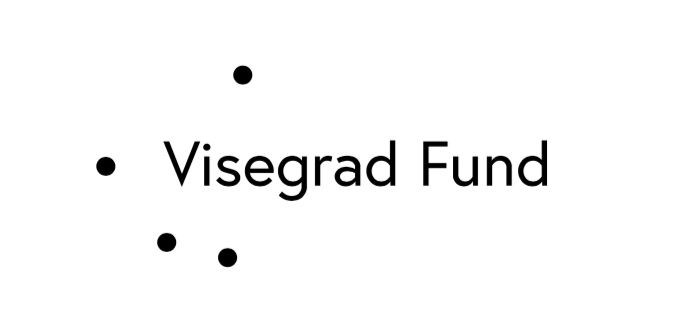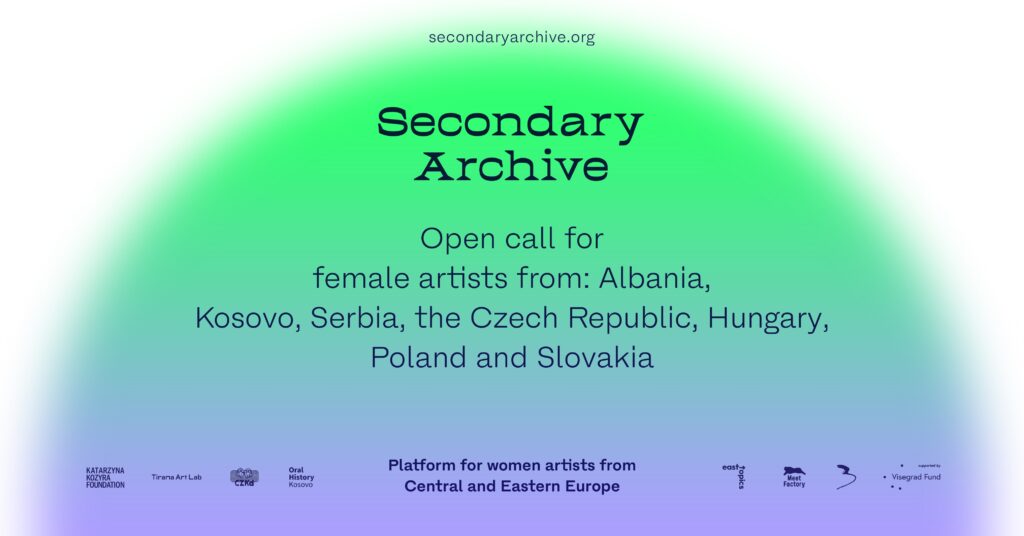Katarzyna Kozyra Foundation and the Partners are flattered to present the winners selected by the jury for the Secondary Archive female artists born after December 31, 1987. The jury awarded one artist from each country (Albania, Kosovo and Serbia) for visionary art practice. Due to the fact that it is an additional edition of an ongoing project, the jury awarded one artist from V4 countries as well.
Elsamina Musiq (ALB) – is a visual artist working with the mediums of photography, video-art, installation, performance, sculpture, painting and drawing. Elsamina through her artistic workshop explores an idea of identity, a phenomenon of doppelgängers, the aspects of truth, knowledge and time.
Laureta Hajrullahu (KOS) – is a multimedia artist. Her artistic work explores privacy, gender, intimacy, digital ecosystems, video games and impossible futures. Through her digital media work, she presents diverse, critically informed views on ‘reality’. She does this by continuously deconstructing and re-evaluating the boundaries between the virtual and physical world.
Sanja Anđelković (SRB) – is an audio-visual artist whose textual artistic practice is based on the research process, with an emphasis on examining the line between the documentary and the speculative, with a focus on issues of gender, socio-political context, and places of personal trauma.
Paula Malinowska (SK) – is a digital artist and photographer. Paula redefines the traditional artistic motifs by exploring the relationship between bodies and nature by working on brand new media of 3D as well as with analogue photography emphasizing the need for change in violated mythology and history.
The jury of the Open Call:
Renea Begolli – is a visual artist, researcher and archivist based in Prishtina. In the SA project, she represents Kosovo.
Adela Demetja – is a curator based in Tirana and Frankfurt am Main, the director of Tirana Art Lab – Center for Contemporary Art. In the framework of Secondary Archive, she is the head of Albanian curatorial.
Róna Kopeczky – is an art historian and curator based in Budapest, co-founder of Easttopics, a platform dedicated to Eastern European art life. In the SA project, she represents Hungary.
Lucia Kvočáková – is an art historian and curator based in Prague, co-founder of BJÖRNSONOVA – a collective linking the artistic activities and projects focused on cooperation originating from Slovakia, the country she represents in the context of the SA project.
Daniela Šiandorová – is a gallery educator and production manager based in Prague. She is collaborating on the realisation of the Czech section of the Secondary Archive.
Bogna Stefańska – is an art historian, a curator, co-founder of the HER Docs Film Festival and researcher of the Atlasu Roku Antyfaszystowskiego [Atlas of the Antifascist Year]. In the project she represents Poland.
Dejan Vasić – is an art historian, active member of the International Association of Art Critics AICA, independent curator, the co-editor of Beton-cultural propaganda kit based in Belgrade. He presents Serbian part of the jury.
_______________________________________________________________________________________________________
Katarzyna Kozyra Foundation (Poland) and the partners are pleased to invite women artists at the start of their careers to participate in an Open Call for Secondary Archive – an online archive of Central and Eastern European women artists. The platform serves as an international source of information about female art from this region. It does so by collecting personal (artistic) statements from three generations of women: those who were active before 1990; the generation who started their art practice right after the fall of the Communist regime; and the youngest artists, born after 1990. So far, the Secondary Archive has gathered statements from the Czech Republic, Hungary, Poland and Slovakia as well as Belarus and Ukraine.
The open call is organised for emerging, and early career female artists to present their voices and perspective. Selected candidates will be invited to write an artist’s statement in cooperation with the project curators. The result of this work will be published on the Archive’s website. Additionally, the jury will select one artist from each country (Albania, Kosovo and Serbia) whose vision and art practice will be encouraged with a cash grant of 500 euros. As for Visegrád Four, the jury will select one artist whose vision and art practice will be encouraged with a cash grant of 500 euros.
Who can participate: Female artists of all visual arts disciplines from Serbia, Kosovo, Albania or V4 countries who were born after December 31, 1987.
Submission rules: Artists interested in participating should send both English and their native language versions of the following documents in one PDF file (20 MB max.):
1) CV
2) Portfolio (For video, please add the links and passwords, if needed)
Send to: hello@secondaryarchive.org
Subject line: Secondary Archive Open Call. Albania / Kosovo / Serbia / Czech Republic / Hungary / Poland / Slovakia (please indicate your country)
Deadline: 1.09.2022
We encourage artists to submit portfolios as early as possible, as the jury will start reviewing and studying submissions as soon as they arrive.
For questions and additional information please write to hello@secondaryarchive.org
The selection process:
16 finalists from Albania, Serbia and Kosovo will be selected from among the submissions received.The Jury of Albania will select 5 artists. The jury of Serbia will select 8 artists. The Jury of Kosovo will select 3 artists. The Jury of V4 will select one artist.
Selected finalists will be announced on September 8, 2022. The final decision on the grant awards will be announced by October 30, 2022.
Project partners: Tirana Art Lab (Albania), Ambasada Kultury (Belarus/Lithuania/Germany), MeetFactory (Czech Republic), Easttopics (Hungary), Oral History Initiative (Kosovo), Center for Cultural Decontamination (Serbia), björnsonova (Slovakia), Artsvit Gallery (Ukraine).
The project is co-financed by the Governments of the Czech Republic, Hungary, Poland and Slovakia through Visegrad Grants from International Visegrad Fund. The mission of the fund is to advance ideas for sustainable regional cooperation in Central Europe.
Visegrad Fund: www.visegradfund.org


